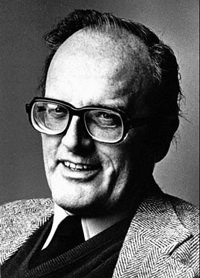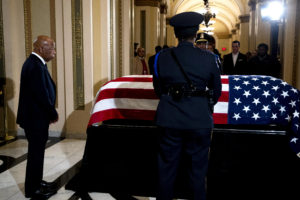The Life and Death of Conrad and the Los Angeles Times
Pulitzer Prize-winning political cartoonist Paul Conrad passed away this month at the age of 86. Truthdig Editor Robert Scheer, a longtime friend and colleague, delivered this eulogy at the public memorial service held Sept. 11.
I am deeply honored that Paul’s family asked me to give this eulogy because I can think of no greater figure in American journalism than Paul Conrad. That is a considered judgment on my part and something I felt long before the moment of his death.
I was in awe of Conrad’s work even before joining the Los Angeles Times in 1976. I know I speak for just about every one of my colleagues during those years at the newspaper when I say that this irrepressible genius of a man was the standard-bearer of that newspaper’s excellence, integrity and passion for social justice during the decades when, under the leadership of Otis Chandler, Tom Johnson and Bill Thomas, that newspaper became one of the very best in the entire world.
His was the exuberance of the uncompromising spirit, the joyous iconoclast who scoffed at the temptations of opportunism and careerism as the work of the devil. He was an inherently kind and considerate man, but he would not suffer fools, be they shouting critics whose phone calls he insisted on answering patiently or even a writer like myself, who took too many words to make his point.
Recently, John Dean, Richard Nixon’s White House counsel who blew the lid off Watergate, lectured in my class at USC and afterward spoke of his admiration for Paul, noting, “Conrad proved that a cartoon is worth a thousand words — just ask Richard Nixon,” who, it should be added, put Con on his infamous enemies list — an award right up there with the three Pulitzer Prizes Paul won.
In the mid-1980s I interviewed Nixon, and even he could not resist what I took to be a forgiving chuckle when I mentioned Paul. Conrad was tough but he was fair. I recall well, during the decade that I lived in Orange County when my wife Narda Zacchino edited the Los Angeles Times’ edition there, that even many of those who disagreed vehemently with Conrad’s cartoons begrudgingly respected his work. He was so often on target against the outrages of the powerful, Democrats included, that his stunning work simply could not be ignored.
I was reminded of that recently when I paid tribute to Paul on our “Left, Right and Center” show on KCRW. I almost fell out of my chair when, for the first time, my right-wing adversary Tony Blankley, Newt Gingrich’s former press secretary, not only endorsed my point but went further in praising Paul. Tony had grown up in Los Angeles where he was a child actor and he stated: “I was raised on Paul Conrad, the most brilliant cartoonist I have ever known.”
I realized yesterday that we have been maintaining a shrine of sorts to Paul’s work, as his framed cartoons cover two walls in our home, and displayed on a nearby shelf are three of his statues — Nixon, Bobby Kennedy, and George W. Bush — the latter being all hat. One of my favorite of his works is a Conrad cartoon of a Nike sneaker with a young girl inside, sewing away. The caption reads: ”There is a young lady who lives in a shoe. The company makes millions, she only makes two.”
From our high-rise condo atop Bunker Hill, I look down on the headquarters of two institutions that were the most important in Paul’s life. One is the Times building, now in bankruptcy, a monument to unfettered corporate greed. After Tom Johnson, the paper’s publishers did not treat Conrad well. In an e-mail I received yesterday, Tom summarized that most startling example of the newspaper’s steep decline.
Tom described how, when he was publisher, he and Bill Thomas and editorial page editor Tony Day would often hear the heated complaints from the most powerful figures in the community: “Paul drew fire from Archbishop Mahoney, Howard Ellison at Edison, Fred Hartley at Union Oil, Sam Yorty, Richard Nixon, Ronald Reagan, David Packard, to name just a few.”
Tom observed that, “On several occasions, Times Mirror leaders and conservative Chandler family members complained loudly to Otis, Bill, Tony and me. To the best of my memory, we either ignored their criticism or defended Paul’s work.” And then Tom added the only valid response to such criticism: “Paul WAS the finest editorial cartoonist in the nation.”
Unfortunately, as legendary New Yorker media critic A.J. Liebling once ruefully observed, “Freedom of the press is guaranteed only to those who own one.” Sadly, the subsequent owners of the Times betrayed not only Paul, finally forcing him out, they betrayed the Times’ commitment to a free press.
The other institution that I see from my window is the Catholic Cathedral — the church that was so important to Paul but which has proved itself fallible in precisely the ways that Paul scorned.
But while Paul was a skeptic, he was not a cynic — in his work and in his life he always held out the hope of human redemption — that justice would prevail and that the moral core that he found at the center of his religious conviction and his love of democracy would ultimately triumph.Paul was like other veterans of that era of what has been called the good war — maybe the last one that can be called that — like the great Ed Guthman, also a Pulitzer winner and Paul’s close friend, and that other Times Pulitzer winner, Phil Kerby, a foil for Paul’s daily journey through the editorial page compound seeking reaction to drafts of his cartoons. Those guys had a confidence to speak truth to power that derived from the deep conviction that they were guardians of the American dream of justice and liberty for all. For them it was never simply a slogan but rather their lifeblood.
There is an adage that I believe defines both the role of the free press and the progressive church that Conrad honored — the injunction to comfort the afflicted and afflict the comfortable — an epitaph that best captures this truly great man.
Paul Conrad in his inspired works of art day after day for more than half a century never betrayed that mission. He did so with brilliance, humor, and integrity that millions came to expect from a cartoon signed “Conrad.”
We have lost an American original whose greatness deeply touched us all. Let us all be grateful for the gift to this nation that was Paul Conrad. Sadly, there will never be another quite like him. Therefore we all, particularly those of us charged in our occupation with the obligation of maintaining a free press in a democratic society, have got to try harder to keep his wondrous spirit alive.
Your support matters…Independent journalism is under threat and overshadowed by heavily funded mainstream media.
You can help level the playing field. Become a member.
Your tax-deductible contribution keeps us digging beneath the headlines to give you thought-provoking, investigative reporting and analysis that unearths what's really happening- without compromise.
Give today to support our courageous, independent journalists.



You need to be a supporter to comment.
There are currently no responses to this article.
Be the first to respond.